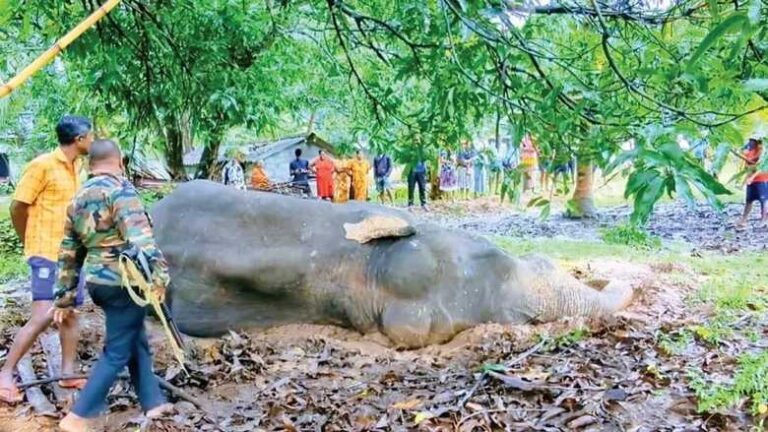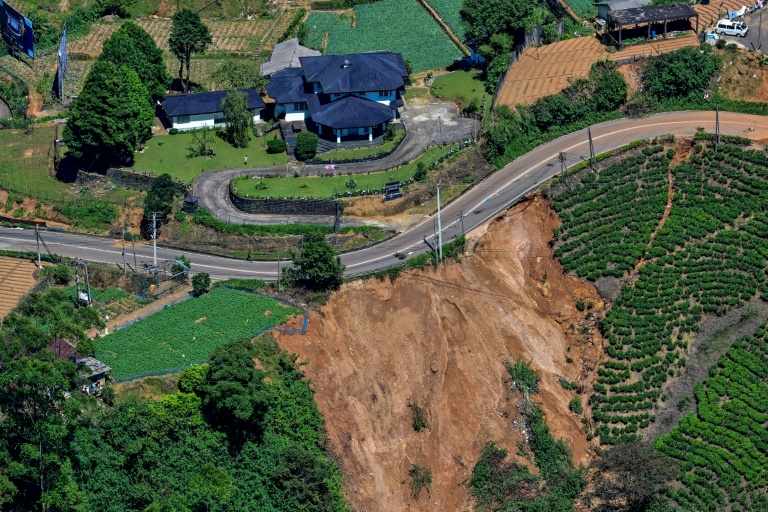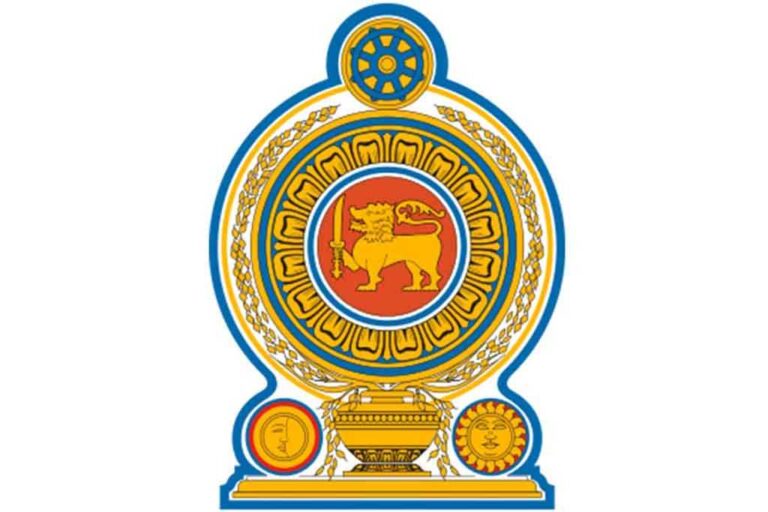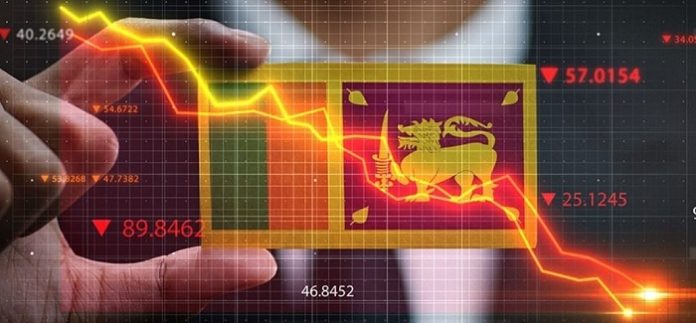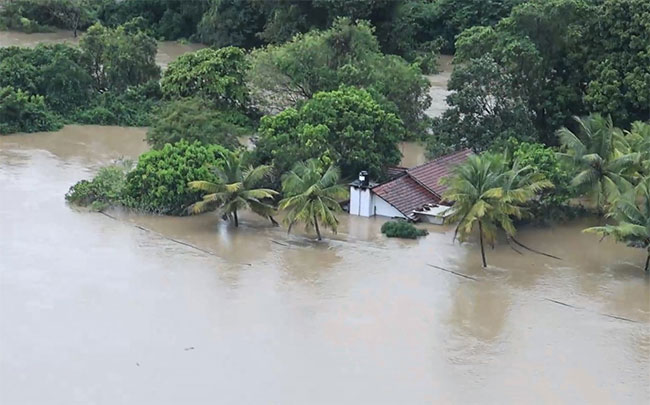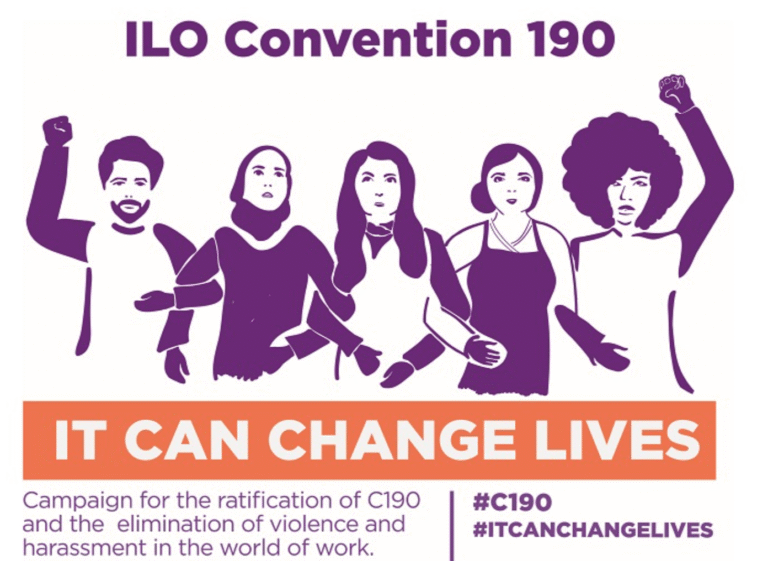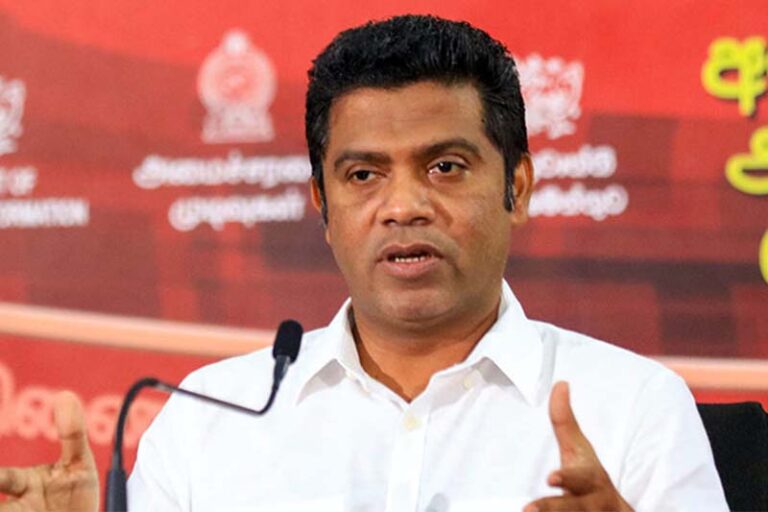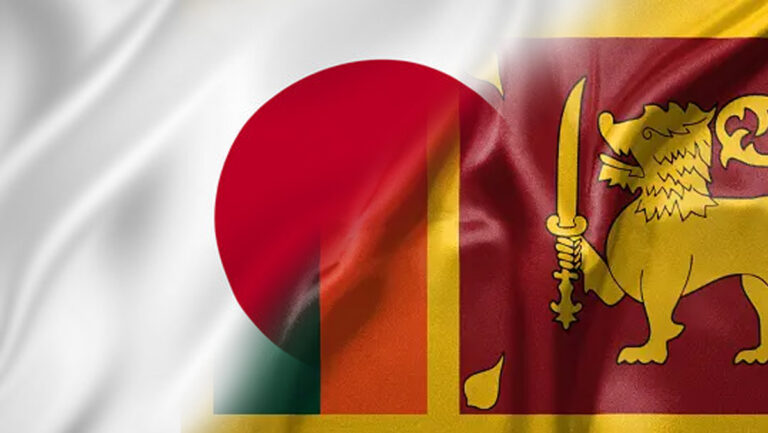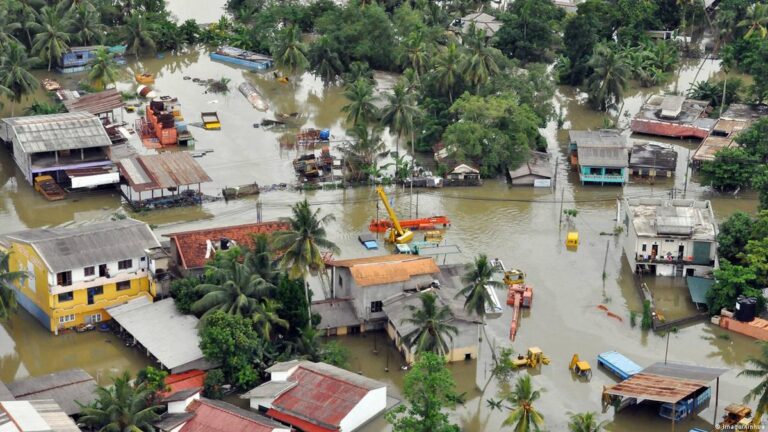By: Isuru Parakrama
December 17, Colombo (LNW): Graphic footage circulating online since yesterday (16) has sparked widespread anger after showing a badly injured elephant being deliberately set alight in a residential garden in the Seeppukulama area of Mihintale.
Wildlife and forest officials confirmed that the animal died following the incident, which took place on Tuesday. The video depicts the elephant lying helpless with a severe injury to its front leg, believed to have been caused by a gunshot, before being subjected to further cruelty when it was set on fire.
Emergency veterinary teams were dispatched as soon as authorities were alerted, but the elephant had already suffered fatal burn injuries by the time they reached the location. Officials said a post-mortem examination will be conducted to formally determine the precise cause of death.
Residents in the area reportedly witnessed the incident and recorded the footage, which was later shared online, prompting immediate complaints to relevant authorities.
Investigations have now been launched, and law enforcement agencies have assured that those responsible for the act will be traced and arrested without delay.
Jury and Executioner the same?
What happened in Seeppukulama, Mihintale, is not merely a crime against wildlife, it is a chilling indictment of a society that allowed cruelty to masquerade as justice. A wild elephant—already helpless from a gunshot wound to its forelimb—was not shown mercy, restraint, or even basic humanity. Instead, it was set on fire with burning torches, in what can only be described as a barbaric public execution.
This was not an act of fear or self-defense. The animal lay immobilised in a home garden, wounded and vulnerable. Wildlife veterinary surgeons arrived and attempted to save its life, but the burns inflicted by human hands were too severe. The elephant did not die by accident, for it was killed deliberately, painfully, and with apparent indifference to suffering.
The most disturbing question is this: who decided that this animal deserved such a fate?
In Seeppukulama, did the perpetrators appoint themselves as judge, jury, and executioner? Since when did mob cruelty replace the rule of law? Sri Lanka has laws to protect wildlife, institutions mandated to respond to conflict, and officers trained to handle such situations. Yet some chose fire over reason, violence over restraint, and spectacle over compassion.
The circulation of the video on social media adds another layer of shame. This was not only an act of extreme cruelty but one committed without fear of consequence, as if the perpetrators believed they would never be held accountable. That confidence is itself a damning reflection of how weakly justice is sometimes enforced.
This elephant’s death must not be reduced to another statistic or forgotten after a brief wave of outrage. Those responsible for shooting the animal, and those who later set it on fire, committed a heinous crime that demands swift identification, arrest, and punishment under the full force of the law. Anything less would signal that brutality is tolerated, and that the powerless—human or animal—can be destroyed without consequence.
Are the Jury and the Executioner the Same in Seeppukulama, Mihintale? Outrage as Elephant Killed in Brutal Attack
Government’s Policy Reforms Risk Delaying Cyclone Recovery
Sri Lanka’s post-cyclone recovery effort stands at a crossroads as the Government rolls out sweeping disaster management reforms amid one of the largest humanitarian crises in recent years.
The latest meeting of the National Council for Disaster Management, convened under President Anura Kumara Dissanayake, reflects renewed political attention after years of institutional dormancy. Yet the growing gap between strategic planning and on-the-ground recovery is becoming increasingly visible.
The Council approved steps toward establishing a National Integrated Disaster Management Mechanism and amending the Disaster Management Act, signalling a shift toward centralised coordination and data-driven decision-making. While these reforms aim to correct long-standing weaknesses, their immediate impact on rebuilding homes, restoring livelihoods, and resettling displaced families remains uncertain.
Cyclone Ditwah has affected an estimated 2.2 million people, damaging over 118,000 houses and forcing tens of thousands into temporary shelters. For many, daily survival now depends less on long-term planning frameworks and more on rapid relief delivery, simplified compensation processes, and swift reconstruction approvals.
A key concern emerging from the Council discussions is procedural overload. New proposals such as the Central Fragile Area Management Plan, digital data platforms, and certification systems for landslide mitigation require inter-agency coordination that Sri Lanka has historically struggled to execute efficiently. Delays in data validation and updates have already slowed beneficiary identification, a problem acknowledged by both the President and the Opposition Leader.
The President’s pledge to relocate families from high-risk zones and build 8,000 houses by 2026 offers hope but also raises questions about timelines and interim solutions. Previous resettlement programmes have often stalled due to land acquisition disputes, funding gaps, and administrative inertia. Without emergency fast-track mechanisms, affected families may remain in limbo for years.
Even routine relief measures have encountered obstacles.The Rs. 25,000 flood-cleaning allowance, designed as immediate assistance, has faced implementation issues serious enough to require direct presidential orders for resolution. Such delays expose weaknesses in local-level coordination, despite central policy clarity.
The establishment of a Foreign Aid Coordination Committee is intended to ensure transparency and accountability. However, humanitarian agencies caution that excessive clearance procedures during emergencies can undermine responsiveness and discourage rapid donor engagement a risk Sri Lanka can ill afford amid declining external assistance.
Lessons from past disasters further complicate policy choices. The Government’s disclosure of heavy financial losses under the 2016 flood insurance scheme highlights fiscal risks, but postponing reforms until ideal models are designed could leave disaster victims without adequate protection.Sri Lanka’s challenge now is balance: reforming institutions without paralysing recovery. Unless policy decisions are accelerated, legal bottlenecks eased, and emergency authority devolved, disaster governance reform may inadvertently deepen human suffering instead of alleviating it
Rs.150 Million e-Court Push Tests Government’s Reform Credibility
The government’s decision to allocate Rs. 150 million for the e-Court Project has reignited debate over whether digital reforms can realistically rescue Sri Lanka’s overstretched judicial system or whether they risk becoming another well-intentioned but under-executed initiative.
Approved by the Cabinet and funded through the Clean Sri Lanka Project, the allocation is intended to support the Judicial Service Commission in rolling out digital court services nationwide. The government has framed judicial digitalisation as a cornerstone of its reform agenda, closely tied to IMF-backed structural reforms scheduled under the 2026–2030 Public Investment Programme.
At the heart of the initiative is the expansion of systems already introduced at the Supreme Court, including a dedicated website and an electronic Case Management System? These tools are expected to be extended to lower courts, the Court of Appeal, and judicial training institutions, ultimately forming a unified national judicial data network.
Officials argue that such a network could address long-standing weaknesses in case tracking, data accessibility, and procedural transparency. Chronic delays have contributed to declining public trust and, in extreme cases, citizens resorting to extrajudicial measures due to frustration with prolonged legal battles.
The proposed e-Court model goes beyond basic digital filing. It envisions paperless processes, remote participation in hearings, and secure online access points known as Points of Presence (PoPs). These PoPs could be established at post offices, police stations, district secretariats, or other public institutions, allowing litigants and lawyers to participate in proceedings without physically attending distant courts.
Justice Ministry officials emphasise that this approach could significantly reduce travel costs, time wastage, and safety risks associated with long commutes. They note that a large proportion of court attendees currently appear only to receive administrative updates rather than participate in substantive hearings.
From a governance perspective, experts describe e-Court services as comparable to tele-working and business process outsourcing models, relying on computer-aided systems to capture, store, retrieve and analyse judicial data. If effectively implemented, these systems could improve performance monitoring and policy planning within the justice sector.
But scepticism remains. The Attorney General’s Department estimates that approximately 800,000 cases are pending across the system, including 95,000 unresolved matters and more than 100 high-profile cases. While special courts have been introduced to fast-track proceedings, critics warn that technology alone cannot overcome institutional inertia, capacity gaps, or resistance to change.
Without sustained funding, legal reforms, judicial training, and safeguards for data security and inclusivity, analysts caution that the Rs. 150 million investment may deliver only incremental gains. The success of the e-Court Project, they argue, will ultimately be measured not by websites launched or systems installed, but by whether ordinary citizens experience faster, fairer, and more accessible justice.
Economic Engines Slow but Stay Resilient in November
Sri Lanka’s manufacturing and services sectors maintained expansion in November, reinforcing their role as key drivers of economic activity, even as growth softened from the previous month, Central Bank data show.
The Manufacturing PMI eased to 55.5 in November from 61 in October, reflecting slower but sustained expansion. Analysts view this moderation as a natural adjustment following strong October performance rather than a sign of weakening fundamentals. The manufacturing sector continues to support employment, exports, and domestic supply chains, particularly through food processing and apparel manufacturing.
CBSL reported that new orders expanded across the sector, largely driven by increased demand for food and beverage products and textiles and apparel ahead of the festive season. While production remained at neutral levels, firms increased hiring and purchases of raw materials, signalling confidence in near-term demand.
Extended supplier delivery times pointed to persistent input demand, suggesting that manufacturing activity remains resilient despite logistical and weather-related challenges. Importantly, business expectations for the next three months remain positive, with seasonal demand expected to offset recent disruptions.
In contrast, the services sector experienced a sharper slowdown. The Services PMI declined to 50.5 in November from 66 in October, indicating marginal growth. Adverse weather conditions disrupted transport, tourism, and retail activity, particularly towards the end of the month.
Nonetheless, accommodation, food, and beverage services continued to expand, reflecting sustained tourism-linked activity and domestic consumption. Financial services also strengthened further, supported by increased lending, underscoring the sector’s contribution to investment flows and credit-driven economic recovery.
New business formation increased, supported by financial services and wholesale and retail trade, while employment growth continued as firms hired to meet seasonal demand. The increase in backlogs of work, after several months of decline, suggests rising operational pressure as activity stabilises.
CBSL noted that expectations for business activity over the next quarter remain favourable, though at a moderated pace. While weather-related risks and demand volatility remain concerns, relatively stable macroeconomic conditions and expected festive spending continue to underpin confidence across both sectors.
Taken together, November PMI data suggest that while momentum has slowed, Sri Lanka’s manufacturing and services sectors remain on a recovery path, continuing to support growth, jobs, and economic stability as the year draws to a close.
Foreign Aid Dries Up Amid Diplomatic Communication Breakdown
Sri Lanka’s post-cyclone recovery effort is increasingly overshadowed by concerns that weak diplomatic communication and inconsistent messaging have undermined international confidence. Despite repeated assurances from the government, foreign assistance secured so far represents only a fraction of the US$6.5–7 billion required to rebuild after Cyclone Ditwah’s devastation.
As of December 13, total foreign funding commitments and disbursements stood at approximately US$170 million, most of it tied to emergency relief rather than reconstruction. This shortfall has intensified scrutiny of the government’s crisis diplomacy, particularly its ability to articulate needs, prioritise projects, and reassure donors about accountability mechanisms.
The planned international donor conference is now being positioned as a corrective measure. However, analysts note that donor conferences are not automatic solutions; they succeed only when governments demonstrate preparedness, credibility, and strategic clarity. At present, Sri Lanka appears to be struggling on all three fronts.
While several countries including India, the US, China, Japan, Australia, Russia, and Pakistan—responded promptly with emergency aid, few have indicated readiness to commit large-scale reconstruction funding. Diplomatic sources suggest that donors remain cautious, citing uncertainty over implementation capacity and the absence of a compelling recovery narrative from Colombo.
The contrast with past disaster responses is stark. Following the 2004 tsunami, Sri Lanka leveraged strong diplomatic leadership to secure rapid and generous global backing. Today, despite louder public statements, engagement appears weaker. Communication from the Foreign Ministry has been reactive rather than strategic, failing to translate sympathy into sustained financial commitments.
The Rebuilding Sri Lanka Fund, though symbolically important, has raised only Rs. 3.4 billion, underscoring the limits of domestic fundraising. Meanwhile, the UN-backed Humanitarian Priorities Plan, seeking US$35.3 million, addresses immediate survival needs but does little to close the vast reconstruction financing gap.
There remains potential for increased aid flows under the current government, particularly if the donor conference is used to present a transparent, data-driven recovery plan linked to governance reforms and monitoring mechanisms. Yet this window may narrow quickly if communication failures persist.
Ultimately, Sri Lanka’s recovery will depend not on headline announcements but on disciplined diplomacy. Without a marked improvement in international engagement and messaging, the donor conference risks exposing, rather than resolving, the government’s inability to convert goodwill into meaningful support.
Cabinet Approves Legal Framework to Ratify ILO Convention on Workplace Violence and Harassment
The Cabinet of Ministers has approved a resolution to introduce the necessary legal provisions to enable Sri Lanka to ratify and implement the International Labour Organization (ILO) Convention on Eradicating Violence and Harassment in the World of Work (Convention No. 190).
Adopted at the 108th Session of the International Labour Conference in 2019, Convention 190 is the first international labour standard to specifically address violence and harassment in the workplace.
The convention was presented to Parliament in May 2021, following a Cabinet decision taken earlier that year.
According to the government, ratification and implementation of the convention will contribute to the elimination of violence and harassment in both the formal and informal sectors, promote safer and more secure working environments, and encourage greater participation of women in the workforce.
Accordingly, the Cabinet of Ministers approved the proposal submitted by the Minister of Labour to take the necessary steps to introduce the required legal provisions for the ratification and implementation of the ILO Convention.
Govt Warns Media Against Unverified Reporting on Cyclone Ditwah
Cabinet Spokesman and Minister of Mass Media Nalinda Jayathissa on Tuesday cautioned media institutions against disseminating unverified information, as the government rejected allegations that it failed to act on early warnings related to severe weather conditions caused by Cyclone Ditwah.
Speaking at a media briefing following Cabinet decisions taken on December 15, Jayathissa defended the accuracy of official information released to the public and dismissed opposition calls for a parliamentary select committee to investigate the matter.
“They are free to go to court if necessary. Then we can demonstrate how certain media institutions edited and distorted these clips,” he said.
Jayathissa said the government had already provided detailed explanations through multiple television discussions and a comprehensive statement in Parliament, maintaining that allegations circulating in sections of the media were misleading and inaccurate.
He reiterated that the Department of Meteorology formally issued information on critical weather conditions on November 25, rejecting claims that authorities were alerted significantly earlier.
The minister dismissed allegations broadcast by some television channels that the government had received information about the cyclone as early as November 12, describing such claims as false and irresponsible.
“These are completely false allegations,” Jayathissa said.
Responding to claims that authorities were informed through 23 red notices, Jayathissa said official records showed that 19 of those notices were issued after November 27, a timeline he said could be verified via the Disaster Management Centre’s website.
He also criticised reports based on an article published by India’s Indian Express, which some Sri Lankan media outlets cited as evidence that Indian meteorological authorities had warned of the cyclone from November 12. Jayathissa said the Ministry of Foreign Affairs, in coordination with the Ministry of Defence, had sought clarification on the issue.
Jayathissa said Sri Lanka’s Department of Meteorology confirmed on the morning of November 25 that the weather system had weakened into a deep depression, and stated only on November 27 that it had the potential to develop into a cyclone.
“All of this can be verified through archives and online sources,” he said, adding that repeatedly revisiting the issue was unnecessary.
The minister warned that the government would not hesitate to take action if false reporting continued, cautioning that misinformation could lead to public unrest, social conflict and threats to national security.
Seven Sri Lankan Cricketers to Feature in IPL 2026
Seven Sri Lankan cricketers will take part in the Indian Premier League (IPL) 2026 season, with three players securing contracts at Tuesday’s mini-auction, while the remaining four were retained by their respective franchises.
At the auction, Pathum Nissanka was signed by Delhi Capitals, while Wanindu Hasaranga was picked up by Lucknow Super Giants. Fast bowler Matheesha Pathirana was also bought at the auction, with Kolkata Knight Riders securing his services.
The other four Sri Lankan players will return to the tournament after being retained by their teams. Delhi Capitalsretained Dushmantha Chameera, while Royal Challengers Bengaluru opted to retain Nuwan Thushara.
Meanwhile, Sunrisers Hyderabad retained two Sri Lankan players — Kamindu Mendis and Eshan Malinga — continuing the franchise’s confidence in Sri Lankan talent ahead of the upcoming season.
Japan Extends $2.5 Million Emergency Grant to Cyclone-Hit Sri Lanka
The Japanese government has decided to provide an emergency grant of US$2.5 million to Sri Lanka in response to the severe humanitarian situation caused by recent cyclone-related disasters, Japanese Foreign Minister Toshimitsu Motegiannounced on Tuesday.
The grant will be channeled through international aid agencies to support humanitarian assistance efforts, including the provision of food, daily necessities and other essential relief items for affected communities.
Landslides and flooding triggered by a cyclone that struck Sri Lanka in late November have resulted in the deaths of more than 600 people, causing widespread damage and displacement across several parts of the country.
Speaking at a press conference, Minister Motegi said Japan would continue to extend “seamless support to our long-time friend, Sri Lanka” to ensure the earliest possible recovery and reconstruction of the disaster-affected areas.
He also noted that a Japanese disaster relief medical team returned home earlier on Tuesday after providing approximately 1,250 medical treatments over a period of about two weeks in Sri Lanka.
RDA Suffers Rs. 75 Billion Loss Due to Disaster Damage; Rs. 190 Billion Needed for Rehabilitation
Sri Lanka’s Road Development Authority (RDA) has incurred an estimated loss of Rs. 75 billion following widespread damage to roads and bridges caused by recent disaster conditions across the country, officials revealed before a parliamentary committee.
Officials from the Ministry of Transport and Highways and Urban Development informed the Sectoral Oversight Committee on Infrastructure and Strategic Development that preliminary assessments show damage to 316 roads and 40 bridges under the RDA’s authority. They said approximately Rs. 190 billion would be required to fully rehabilitate the affected infrastructure.
The disclosures were made at a committee meeting held on December 11 at Parliament, chaired by MP S.M. Marikkar, which focused on reviewing the disaster’s social, economic and environmental impacts.
The committee chair noted that assessments of damage to railway lines and regional roads are yet to be completed and stressed the need for the ministry to take the lead in establishing a proper mechanism to allocate funds for the rehabilitation of regional road networks.
Officials also said plans are underway to secure a Rs. 2 billion loan from the World Bank, with additional funding expected from other institutions to support recovery efforts.
Meanwhile, the Ceylon Electricity Board (CEB) reported losses of around Rs. 20 billion due to disaster-related damage. CEB officials said discussions are ongoing with the World Bank to obtain funding assistance. However, the committee chair urged the board to seek grant funding instead of loans, warning that borrowing could eventually lead to increased electricity tariffs.
The Lanka Electricity Company (Pvt) Ltd. reported losses of approximately Rs. 252 million, stating that repair costs could be met through existing budgetary allocations without the need for additional external funding.
The National Water Supply and Drainage Board estimated losses at around Rs. 5.6 billion, with damage reported to 156 water supply schemes. Officials said all affected schemes have since been restored following maintenance work. The Ministry of Housing, Construction and Water Supply added that efforts are underway to obtain grant assistance from the Asian Development Bank for rehabilitation work.
Emphasizing the importance of disaster preparedness, the committee chair said the Sectoral Oversight Committee remains ready to support relevant ministries and institutions in strengthening resilience against future disasters.
The meeting was attended by MPs Nalin Bandara Jayamaha, Ajith P. Perera and Asitha Niroshana Egoda Vithana, along with senior government officials.

